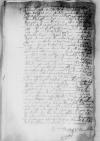Freuntlichnn grus mit aller seleighait wunschung zuvorann. / Edler, ernfesterr her, gunstiger freundt. /
In einh...n cf. Johann von WERDEN to Ioannes DANTISCUS [Preußisch Mark?], [1538-12-14?], CIDTC IDL 6339, probably⌊cf. Johann von WERDEN to Ioannes DANTISCUS [Preußisch Mark?], [1538-12-14?], CIDTC IDL 6339, probably⌋ hab ich ein sondrenn wolgefallenn und freudt gehabt
/ zu wissenn, wies ummb Ewer Herlichkeit gesuntheit und stande zu ghe. / Und ist mir nemlich lieb gewes[en], das sich Ewer Herlichkeit mit den iren in sichere lufft begeben. Ouch hab ich gernn gelesenn die ursachenn, / derhalbnn sich Ewer Herlichkeit an Albrecht I von Hohenzollern-Ansbach (Albrecht von Brandenburg) (*1490 – †1568), 1511-1525 Grand Master of the Teutonic Order; from 1525 to his death Duke in Prussia as a liegeman of the Polish king; son of Friedrich V of Brandenburg der Ältere and Sophia Jagiellon (daughter of Casimir IV Jagiellon), nephew of Sigismund I, King of Poland; founder of the university in Königsberg (1544)⌊furstliche durchlauchtAlbrecht I von Hohenzollern-Ansbach (Albrecht von Brandenburg) (*1490 – †1568), 1511-1525 Grand Master of the Teutonic Order; from 1525 to his death Duke in Prussia as a liegeman of the Polish king; son of Friedrich V of Brandenburg der Ältere and Sophia Jagiellon (daughter of Casimir IV Jagiellon), nephew of Sigismund I, King of Poland; founder of the university in Königsberg (1544)⌋ zufuegenn gesint. / Es sol mir ouch Ewer Herlichkeit ein hercz lieber gast sein. / Wirt do bey zu vilen dingen nucz, / das sich Ewer Herlichkeit hie herr bogebe, / do mit einer den andrenn trostenn und vertraulich von mancherley notigenn sachenn reden moge etc. Das Ewer Herlichkeit sich beclagt des ungelebens etc. des wirt Ewer Herlichkeit vil von mir horen, / das hembd let nicht ab. / Mir wirt alles, das hie im Royal Prussia (Prussia Regalis), region, part of Prussia annexed to the Kingdom of Poland in 1466 under the provisions of the Second Peace of Thorn⌊landeRoyal Prussia (Prussia Regalis), region, part of Prussia annexed to the Kingdom of Poland in 1466 under the provisions of the Second Peace of Thorn⌋ geschicht / und am hove nicht gefellig schult gebenn / und ist von den unsernn nymant, der sich meiner oder des gemeinen nuczes an nympt, / so mues ichs ouch lossenn bleiben. / Ich wil nach wol wissen aus der leyment zu wicklen etc. Was sich aber aus solcher unachtsamheit dissem armenn Royal Prussia (Prussia Regalis), region, part of Prussia annexed to the Kingdom of Poland in 1466 under the provisions of the Second Peace of Thorn⌊landeRoyal Prussia (Prussia Regalis), region, part of Prussia annexed to the Kingdom of Poland in 1466 under the provisions of the Second Peace of Thorn⌋ und uns mit der zceit / allenn wirt zutragenn, / ist am tage / und ghet teglich mher ann, / so das nichts sol sein, was uff unsernn tagfertenn gehandelt, / gesaczt unnd beslossenn. / Was dar aus folgen wil, / bedarff keiner ausligung. / Es wil am hove ider gefallenn, / do mit mues der gemein nucz leidenn, / so es nicht anders wil sein. / Ich wil mich ouch wol wissenn dar in zu schicknn. / Die zceise sol uff Marienburg (Malbork), town and castle in northern Poland, Pomeranian Voivodeship, on the Nogat river, a branch of the Vistula at its delta, the capital of the Grand Masters of the Teutonic Order in Prussia (1309-1457), a voivodeship capital in Royal Prussia, which belonged to the Kingdom of Poland (1466-1772). Marienburg (taking turns with Graudenz (Grudziądz)) was the venue for the Provincial Diets of Royal Prussia, which were chaired by the bishop of Ermland (Warmia)⌊MarienborgMarienburg (Malbork), town and castle in northern Poland, Pomeranian Voivodeship, on the Nogat river, a branch of the Vistula at its delta, the capital of the Grand Masters of the Teutonic Order in Prussia (1309-1457), a voivodeship capital in Royal Prussia, which belonged to the Kingdom of Poland (1466-1772). Marienburg (taking turns with Graudenz (Grudziądz)) was the venue for the Provincial Diets of Royal Prussia, which were chaired by the bishop of Ermland (Warmia)⌋ an aller ordnung / darzu geseczt / gebrauch... und ausweisenn. So dis so allenn gefelt, / gilt mir gleich etc. Was daran und anderemm gelegen, / wil die feder nicht ausrichten, / derwegen ich Ewer Herlichkeit gernn bin gewordenn, / die Got der almechtige mit irer liben wife of Johann von WERDEN ⌊hausfrawennwife of Johann von WERDEN ⌋, / die ich und al die meinenn thun grussen, / in gutter gesuntheit zu langen zceitnn wolde bewarenn. /

